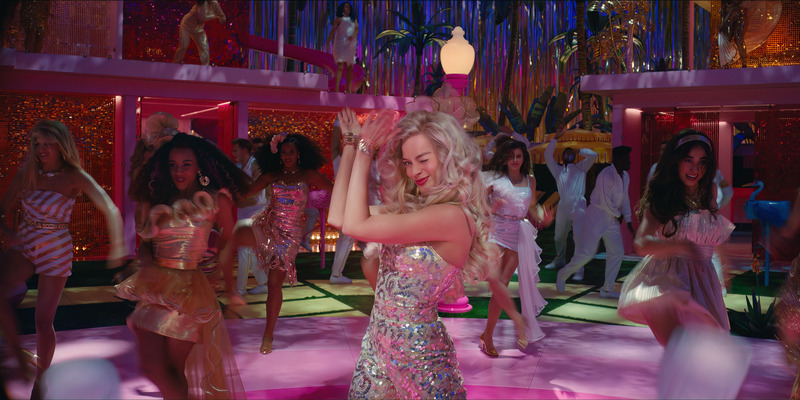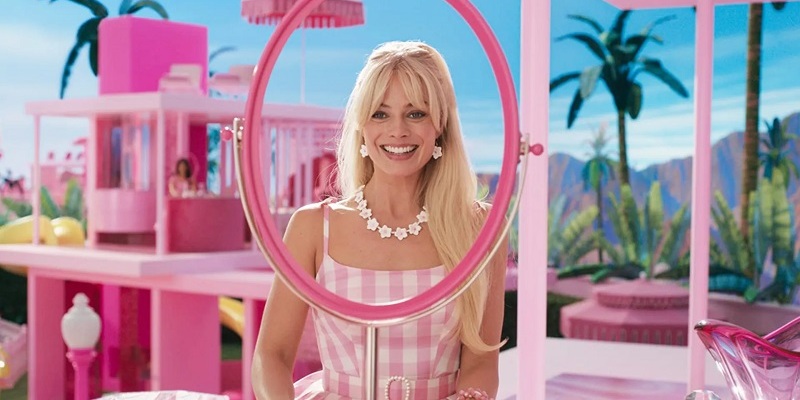
Review by
Eric Hillis
Directed by: Greta Gerwig
Starring: Margot Robbie, Ryan Gosling, Ariana Greenblatt, America Ferrera, Will Ferrell, Kingsley Ben-Adir, Simu Liu, Issa Rae, Rhea Perlman

I spent most of the 2000s working for a soulless corporation that
underpaid and overworked its frontline staff while constantly rewarding
its top brass with pay rises regardless of how badly they were
performing (yeah, that doesn't exactly narrow it down). Every year
they'd invite the staff of every branch in the country to a Christmas
party, which was held in February because the staff had to work over
Christmas. The party was essentially an excuse for the top brass to tell
us all how great they were and how great we were all doing, and
encourage us to imagine how much greater we could be if we did even more
work for no additional reward. The lowlight of the evening was when the
lights would go down, a large screen was unfurled and we were forced to
watch a video that poked fun at the top brass. Absolutely insufferable
and filled with in-jokes that left anyone who didn't work in the
company's head office scratching their heads, it was their way of trying
to convince their underlings they had a sense of humour about evil they
were, much like how former American presidents make jokes about how many
brown people they killed at dinner engagements once they leave the White
House.
Thankfully those videos were only five minutes long.
Greta Gerwig's Barbie (co-written with her creative
and romantic partner Noah Baumbach) is essentially one of those
videos stretched to two hours. The evil corporation poking fun at itself
in this case is Mattel, a company founded by a man named Jack Ryan who
previously designed the sort of missiles that would kill those brown
people American presidents like to joke about (and yes, his name really
was Jack fucking Ryan). With their top-selling toy, Barbie, Mattel has
been getting rich for decades while making little girls feel shitty
about themselves, so in a self aware move they hired the closest thing
mainstream American cinema has to a feminist filmmaker now to helm the
thing.

The result is exactly what you expect from a corporation that wants to
continue making money from an outdated product while pretending it has
the best interests of little girls at heart. It's indicative of the
marketing quandary corporate America currently finds itself in. It knows
its product is bad for you so it hopes sticking a rainbow on the label
might distract you from the fact it's going to destroy your insides (and
hopes you don't look into where and how its product is
manufactured).
Admittedly, it starts off promisingly with
Helen Mirren delivering an amusingly dry narration over a riff on
the opening of 2001: A Space Odyssey, with Margot Robbie's Barbie replacing the monolith and a bunch
of young girls smashing their old fashioned dolls in lieu of this
glimpse of an exciting evolution. Then we get a fun walk through of
Barbieland, though it's really just a knockoff of the opening of
The LEGO Movie, a film which actually succeeds where Barbie so often
fails. Robbie's Barbie, referred to as Stereotypical Barbie, introduces
us to a host of other dolls which all share the Barbie name if not the
classic blonde likeness, along with a similar assortment of Kens. While
the Barbies rule Barbieland, the Kens, including Ryan Gosling's
Stereotypical Ken, exist only to seek acknowledgement from the Barbies,
who largely ignore them in favour of all-girl parties.

Like The LEGO Movie, Barbie's plastic protagonist has an existential crisis, with Stereotypical
Barbie suddenly being consumed by thoughts of death, which the rest of
the Barbies dismiss as a malfunction of sorts (you may begin getting
uncomfortable
Don't Worry Darling
flashbacks at this point). It turns out every Barbie is connected to a
child in the real world, and Robbie's Barbie has been abandoned by Sasha
(Ariana Greenblatt, who somehow isn't the kid sister of Hailee
Steinfeld) because…well, it's 2023, not 1963. To correct the situation
Barbie must travel to the real world and convince Sasha to resume
playing with her toy incarnation, which I guess is basically a voodoo
doll of sorts when you think about it. Much to Barbie's annoyance, she's
accompanied by Stereotypical Ken.
In the real world we're treated to the sort of fish out of water
hijinks that might amuse anyone who hasn't seen
Time After Time, Star Trek IV: The Voyage Home, The Brady Bunch Movie, Twins, Terminator 2 or any other movie from the '80s or '90s.
Like Christine Taylor's Marcia Brady in Betty Thomas's under-rated comic
gem, Barbie finds that in modern Los Angeles being pretty is actually a
burden. And if you believe someone who looks like Margot Robbie would
struggle in the world's most superficial city I have a lorry load of sky
hooks to sell you.

Barbie sells the idea that women and girls have evolved
from their parents and grandparents who were happy to play house, but it
conversely presents men as having remained stagnant. Ken is delighted to
find himself in a world were men can be men, and this film's idea of a
man being a man boils down to being interested in trucks. The film wants
to critique masculinity, but it struggles to nail down what that
actually means today. It presents a surprisingly regressive, binary view
of gender politics, and it often resorts to gay panic when it needs to
poke fun at its male characters. If this is supposed to deliver a
message to young men (and Lord knows they need a good talking to), I'm
not sure what they're supposed to take from it. Don't be a stereotypical
male, it tells them, while also telling them not to indulge in any
behaviour that might be construed as camp. The film's misunderstanding
of the complexities of masculinity can be summed up by how a poster of
Stallone's Rocky Balboa is used to signify toxic masculinity at one
point. If Gerwig and Baumbach think Rocky Balboa is the poster boy for
toxic masculinity they clearly haven't seen Rocky.
In the second half the Brady Bunch Movie shtick is
dropped in favour of a reworking of
Conquest of the Planet of the Apes (there's even a pun
about Century City) in which Gosling's Ken becomes a Caesar figure and
takes over Barbieland, pitting Kens against Barbies, men against women.
If it wasn't already clear that the film's perspective on feminism was
as white as a jar of Hellmann's, it's hammered home as Gerwig pushes her
reductive girls against boys narrative, tone deaf in its unwillingness
to acknowledge key factors like class and race. Annoyingly, all this
insufferable performative white liberalism is capped off with a
genuinely great pun. Whether you can make it to the end to experience it
is another question.


